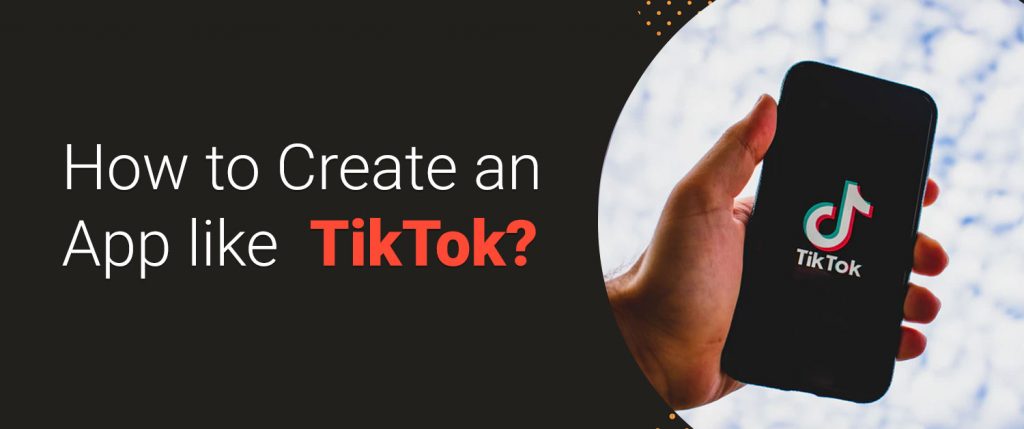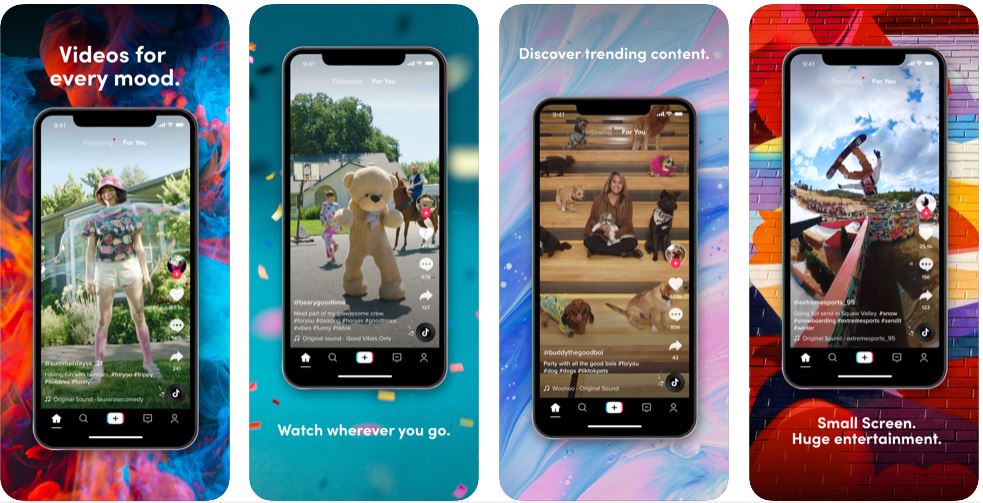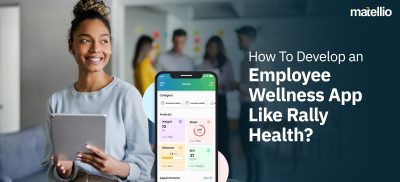
For any social media platform, engagement rate and the number of active users are crucial. Brands like Facebook and Snapchat are losing the same owing to a popular name- TikTok!
TikTok has brought a revolution in the entertainment industry. Many people have risen to immense popularity owing to this application. Present on both iOS and Android platforms, the app is witnessing billions of users around the world
Overwhelming, No?
Today, Matellio has brought a well-researched guide for “How to make an app like TikTok?” for the entrepreneurs wishing to step into this arena. Covering all the foundational aspects, the article may prove to be a perfect read for the starters.
Before we answer the question (how to create an app like TikTok?), let’s get to know this application, a bit better-
What is TikTok?

Owned by Beijing-based tech company ByteDance, Tik Tok is a video sharing platform that allows the user to create music videos and share them with others. Users can play with amazing filters, editing effects, and make creative videos over the platform.
TikTok offers a facility of converting a video into a live wallpaper. Owing to its amazing filters and rich content, the app got famous in a very short time.
You don’t agree? Let Figures do the justification!
- Number of TikTok Downloads from Google Play Store is 48.9 million (March 2020)
- Number of TikTok Downloads from Apple App Store is 13.79 million (March 2020)
- The average time an individual spends in a month on TikTok is 498.09 mins (September 2019).
- Total Number of Tik Tok users in the United States is 45.4 million in 2019
- The number of TikTok Users in the U.S. is expected to be 60.3 million by the year 2024.
- TikTok earned a global revenue of $75 million till March 2019.
Quite Impressive, right?
There must be something this app is offering that has lured users to this extent.
Want to carve a space for yourself? Here is the step-by-step guide for the same.
Keep Scrolling!
Step-by-Step Guide of How to make an App like Tiktok?

1. Know your Audience
Before developing any product, the first thing to understand is your targeted audience. Understand the users’ wants and requirements for crafting an appropriate strategy. There are several things involved in the same:
-
Audience Demographics
Try to find the average age of users, their devices, their location, and much more.
-
Behavioral Trends
Behavioral Trends includes the users’ patience level with slow-loading sites, no. of downloads they do in a decided period, increase the value of the app utility, tolerance for security issues, etc.
2. Craft a Monetization Strategy
Choosing the right monetization strategy is as vital as finalizing the feature kit. Here are some popular methods of doing the same-
-
Raising Funds
This method involves attracting investments at the beginning of the project, which means you try to collect money as donations from businesses or individuals. It is considered as one of the premium methods of app monetization, and even Tiktok relied on it heavily.
-
Advertisements
In-app advertising is a prevalent method for monetization. It usually includes-
- Cost Per Mile charging advertisers for every 1000 impressions their ad receives in the app.
- Cost Per Click charging whenever a user interacts with the ad.
- Cost Per Action is when advertisers have to pay for the specific Action, as newsletter sign-up or app installs.
Although, there is one crucial point to keep in mind- “Advertisements are fine up to a limit, too much in-app ads ruin the customer experience, and at times it results in app uninstallations. Hence, please don’t overdo it. Remember, customer satisfaction is the key.
-
In-app Purchases
Like Tiktop, you should allow your users to support the live users (broadcasters) with virtual currency that can be bought with real money. Users can further exchange these virtual currencies for gifts or coins, whatever you find suitable.
3. Hire a Development Team
The next step here is to hire a development team that can help you in building the product.
- Business Analyst
- Product manager
- Database expert
- UI/UX designers
- Android and iOS developer
- Front-end and back-end developers
- QA expert
- Sales and Marketing team
4. Project Discovery Phase
Audience Research ✔️
Business Model ✔️
Development Team ✔️
Now is the time to begin the project discovery phase.
The Discovery phase involves requirements gathering, business analysis, select tech stack (see point no. 6), project planning, and cost estimation.
- The inception phase usually comprises of following activities that are majorly depended upon the requirements-
- Define the scope of your project- features, business priorities, user roles, etc.
- Craft the development workflow by taking the monetization strategy into a loop.
- Define the concept for future application
- After that, the team would have to prioritize features (covered in upcoming sections), create project milestones, and begin developing an MVP version of the app. (But, why MVP?)
Keep Digging!
5. MVP Development
MVP means Minimal Viable Version. Justifying its name, the app is the minimum functioning model of the project, i.e., it includes the app idea but without any extra bells and buttons.
Why MVP?
Developing a social video application is a complicated project. There is a huge risk involved in building a fully-functional product as the market may or may not accept it.
Therefore, we recommend you to focus on building an MVP version instead. This way, it is easy to figure out how the market is accepting your application, and whatever feedback is received can prove to be helpful in further improvisations.
6. Technology Stack
An app like Tik Tok requires several technologies for various aspects of the app development, the majority of which are covered in the below sections:
- Content delivery networks- Scalable CDN services help in serving user experience and streamlining media securely.
- Video and audio transcoding- Media Files have to be transcoded in different media formats for making them supportable to all the browsers and significant devices. For this, either third-party solutions (like Amazon elastic transcoder) or open-source software like FFMPEG can be availed.
- A universal operating system like Debian
- AWS for Cloud Environment
- Database: MailChimp Integration, Cassandra, Postgres, MongoDB, and HBase
- GWT for a robust programming
- Database management with Datastax
- Secure payment methods like e-wallet, PayPal. Braintree, or Stripe
- Phone, SMS & Voice Verification: Twilio, Nexmo
- Push.io, Twilio for Push Notifications
- Analytics: Spark Streaming, Apache Flink, Azure Stream Analytics,
- Mandrill for emails
- Android App Development– Java & Kotlin
- iOS App Development- C or Swift
- Hybrid App Development- Xamarin, React Native, & Flutter
7. TikTok Features
Here is the list of must-have features & functionality to be included in an app like Tiktok-
Admin Panel |
User Panel |
|
Login into the Portal |
Registers into the App |
|
Manage Users |
Create Profiles |
| Content Management |
Browse Broadcasters |
| Push Notifications |
Hearts & Commenting |
| Monitor Flagged Videos |
Create Videos |
| Handle Reports |
Add Filters & Effects |
| Block Users |
Download & Share the Videos |
|
Monitor Feedback |
Upload Videos |
| Attractive Offers |
Rate or Report the Content |
Take Home Message
TikTok is a popular application, which makes it a tough yet attractive competition.
The key here is to come up with a solution before it gets too late.
Currently, you’re left with two choices-
- A clone solution
- Or something innovative (powered by advanced feature-kit)
Whatever be your approach, make sure you have experts at bay
Liked what you read? Then don’t forget to hit the bell icon!
Happy TikToking!
Disclaimer: Please note that the content of this blog including links, texts, images, and graphics is only meant for informational purposes. We do not intend to infringe any copyright policy or do not possess any third-party material. If you have issues related to any of our content or images, kindly drop your message at info@matellio.com



